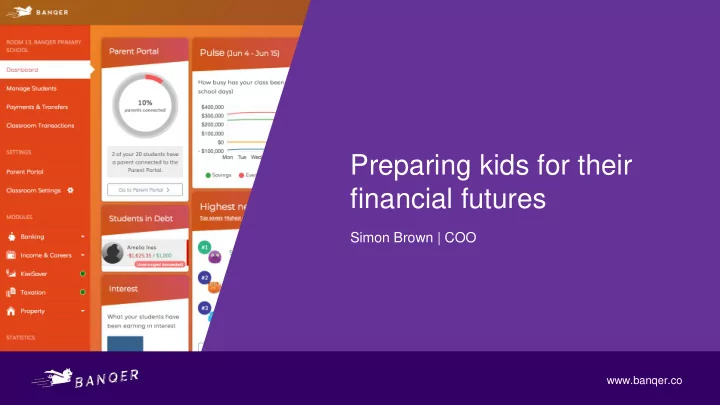

Preparing kids for their financial futures Simon Brown | COO www.banqer.co
FinTech Engagement ● Numerous innovative FinTech solutions in New Zealand ● Consumers need to have a basic level of financial capability to engage in these products www.banqer.co
Let me take you back... Ex-accountant, turned Medbury School, Year 8 Software Developer Team Lead www.banqer.co
Why ● Reliance on family ● Students may understand some basic financial concepts, but putting them into practice is another thing www.banqer.co www.banqer.co www.banqer.co
Ensure all kids are prepared for the financial world ahead www.banqer.co
Partnerships www.banqer.co
Reach New Zealand Australia Launched early 2015 Launched mid 2017 – – 175 schools 850 schools 320 classrooms 2,100 classrooms 7,500 students 61,000 students www.banqer.co
Future ● Deepening and broadening our social impact ● Te reo Maori translation and contextualisation ● Exploring North America www.banqer.co
Thanks! – www.banqer.co @banqer_app www.banqer.co
The Team Micah Hocquard Marc McHardy Ben Wigley Kendall Flutey Pedagogy Lead Design Lead CTO CEO Simon Brown Helena Lowe Alex Miller Liz Phelan COO NZ Sales Lead Developer AUS Sales Lead www.banqer.co
What teachers say www.banqer.co www.banqer.co www.banqer.co
Benefits of financial literacy Personal ● The best chance of making effective financial decisions and minimising the likelihood of being misled and facing financial problems.(2) ● Ignorance of basic financial concepts is linked to failing to plan for retirement, non-participation in the stock market, and poor borrowing behaviour.(1) Societal ● Financially secure families are better able to contribute to vital thriving communities and thereby foster further community economic development. (1) ● Financially literate consumers can make more informed decisions and demand higher quality services, which will encourage competition and innovation in the market. (7) ● Increase economic participation and social inclusion, drive competition and market efficiency in the financial services sector, and potentially reduce regulatory intervention. (1) ● Increasing financial literacy of the least financially literate by 10% would add $6bn per year to the Australian economy and create 16,000 new jobs. (12) www.banqer.co
Importance of starting early ● The low overall level of financial literacy among young people should be of concern, particularly given the profound impact financial literacy has on individuals’ ability to manage their money and maintain financial wellbeing (2) ● The development and integration of financial habits and attitudes begin very early and probably before children reach 7 years old (7) ● Earlier financial education increases the likelihood of later financial education exponentially, with the latter including informal education (1) ● Financial education should start at school. People should be educated about financial matters as early as possible in their lives (8) ● Most 15-year-old students already have some experience with financial transactions, from using a bank account to buying call-credit for their mobile phone. Developing the skills associated with financial literacy has thus become essential for young people on the brink of adulthood and poised to make complex financial decisions that could have an impact on the rest of their lives (15) ● Having a bank account is associated with a higher score in financial literacy in many countries and economies. On average, students in the 13 participating OECD countries and economies who hold a bank account score 33 points higher than students who do not. This difference is largest in New Zealand (15) www.banqer.co
References 1. How Young New Zealanders Learn About Finance: A Longitudinal Study (Financial Education and Research Centre 2012) 2. Personal Financial Literacy Among High School Students in New Zealand, Japan and the United States (Economics Department University of Waikato 2013) 3. Financial literacy and its role in promoting a sound financial system (Reserve Bank Bulletin Vol 70 No 2, 2009) 4. Report on survey of financial literacy (Commission for Financial Literacy and Retirement Income 2012 ) 5. Financial Education Programmes in Schools (OECD, 2008) 6. PISA 2012 NZ Financial Literacy report (MOE 2014) 7. Financial Education for youth; The role of Schools (OECD 2014) 8. Improving Financial Literacy: Analysis of issues and policies (OECD 2005) 9. Improving financial literacy in Australian (Commonwealth Bank Foundation 2014) www.banqer.co
References cont. 10. Connected Learning: An Agenda for Research and Design (Connected Learning Research Network 2013) 11. Towards a New End: New Pedagogies for Deep Learning (Fullan and Langworthy 2013) 12. Improving financial literacy in Australian (Commonwealth Bank Foundation 2014) 13. New Vision for Education: Unlocking the potential of technology (World Economic Forum, 2015) 14. Making sense of financial capability surveys around the world (World Bank 2013) 15. PISA 2012 results; Students and Money, Financial skills for the 21st century (OECD 2014) 16. Advancing National Strategies for Financial Education (OECD 2103) 17. High level principles on national strategies for Financial Education (INFE/OECD 2012) 18. Financial education at School: international OECD/INFE guidelines (OECD 2011) 19. The Economic Importance of Financial Literacy (Lusardi & Mitchell 2014, Journal of Economic Literature) www.banqer.co
Recommend
More recommend